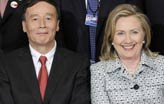From Chinese Press
Singapore election coverage shows Western arrogance
Updated: 2011-05-19 10:58
(peopledaily.com.cn)
The opposition in Singapore's parliamentary elections made a breakthrough on May 7, winning six out of 87 seats in the parliament for the first time. Shortly afterwards, Lee Kuan Yew and Goh Chok Tong announced that they would quit the cabinet, drawing more attention to the political situation in Singapore.
Many Western media agencies quickly associated the political system of Singapore with the retirement of Lee and Goh as well as the setback that the ruling party suffered in the parliamentary elections. A British media outlet published an editorial under the headline "Singapore is taking the First Steps to True Democracy," and another Western media outlet claimed in its report that Singapore has never had a "real two-party system."
The Western media said directly that the existing political system of Singapore is not "true democracy," implying that only Western democracy is the genuine democracy. Some Western media reports even related the political changes in Singapore to the unrest in West Asia and North Africa, claiming that they were all the results of the global wave of democratization.
It seems that the Western media have forgotten about Singapore's remarkable economic achievements in recent years. Singapore's GDP grew nearly 15 percent in 2010, making it the fastest-growing economy in the world, and it surpassed certain Western countries in terms of per capita income and social security coverage. However, these facts were seldom mentioned in Western media reports.
Obviously, the Western media are not interested in how Singapore achieved great economic progress because the Eastern country's successful development mode is not in line with Western democratic standards. People can be reminded of the Western media's stereotyped viewpoints by the fact that even now they still call Singapore a "dictatorship" or "quasi-dictatorship."
Objectively, the changes reflected by the elections in Singapore are mainly from two aspects. The first is the start of the adjustment to the leadership succession within the ruling party through the appointment of new leaders and the retirement of old ones. The second is the changes in the demand of the new generation of voters who hope to raise the voice of the opposition in the parliament rather than expect another party to replace the ruling People's Action Party. The adjustment and changes does not represent major unrest in Singapore's political system.
Logically speaking, Singapore is already a developed country and should have the same status as developed Western countries, an assertion about which Western media agencies appear to disagree. Some Western countries are facing much more severe unrest compared with Singapore. Some European countries are deeply trapped in the debt crisis that will possibly cause a severe impact on the world economy.
However, are there any Western media agencies that have analyzed the problems in these countries from the angle of their political system? The issues facing Asian countries are surely issues involving their political systems, while the issues facing Western countries are limited to economic ones. Does this result from prejudice or ignorance?
Singapore does have its problems, but the problems facing Singapore are the ones that are emerging after it has developed to a rather high level. Public complaints about housing prices and the rise in the number of foreign workers are partly because of the higher demand generated by the people after they have led better lives and gained many benefits from development.
The future of Singapore does face challenges, but the challenges will surely not involve whether Singapore's political system will be closer to Western democracy or whether reforms coveted by some will occur. The real challenge is whether Singapore can continue the way of development that has been consistent with its context.
The political changes in West Asia and North Africa have made some Westerners more irrational about their political system and sharpened their sense of moral superiority. Such misconceptions and superiority are evidently not something constructive to the increasingly polarized world.
Specials

Comments on S&ED
The China-US Strategic and Economic Dialogue in Washington earlier this month achieved some remarkable results.

The song dynasty
There are MORE THAN 300 types of Chinese operas but two POPULAR varieties are major standouts

Sino-US Dialogue
China and the US hold the third round of the Strategic and Economic Dialogue from May 9-10 in Washington.